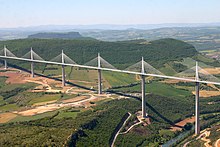Millau
Millau (French pronunciation: [mijo] ⓘ; Occitan: Milhau pronounced [miˈʎaw]) is a commune in Occitania, France.
The site of Condatomagus was identified in the 19th century by Dieudonné Rey; it was close to the major earthenware centre in the Roman Empire, La Graufesenque.
[a] Despite major new developments in the late twentieth and early twenty-first centuries, the centre of the old Roman and medieval town on the opposite (left) bank of the Tarn remains poorly excavated, and the newly renovated Maison du Peuple, almost on the site of the old Roman forum, saw no archaeological dig prior to the excavation of the new, very deep, foundations.
[3] At this time, the town was part of the former province of Rouergue where local people spoke Rouergat, a dialect of the Occitan language.
Only one arch remains, with a mill that is now an art gallery, as testament to this significant trading route from north to south across pre-Renaissance France.
The McDonald's was quickly completed and José Bové, one of the leaders of the dismantling operation, was sentenced to a short prison term.
This has been the arms of the Crown of Aragon since 1187, but since 1271 surmounted with the leader of France (Azure three fleurs de lys) indicating that this is a bonne ville (good town), i.e. a commune reporting directly to the king.
Also waterproofing concrete and paving large areas has increased significantly water from rain discharged directly to the river inducing a phenomenon called "flush" that is quite destructive to aquatic fauna and the banks.
Nowadays, the community consists of 15 communes with the addition of Comprégnac, Saint-Georges-de-Luzençon, La Roque-Sainte-Marguerite, Saint-André-de-Vézines, Mostuéjouls, Peyreleau, Rivière-sur-Tarn and Veyreau.
The town is now a tourist destination with one of the largest campsites in the Massif Central, benefiting from the attractive surrounding landscapes and its architecturally-acclaimed Viaduct.
Higher education courses are offered by the Institute of Nursing Training (IFSI), Jean Vigo High School (BTS), and the Conservatoire National des Arts et Métiers (CNAM).
The Millau Viaduct, tallest cable-stayed road bridge in the world, which carries the A75 autoroute across the Tarn valley, relieved the town of much of its traffic, particularly during the summer months.
Although industrial fabric has all but disappeared, a few workshops continue to manufacture gloves for major French fashion and luxury brands.
Farming production, including Roquefort cheese made from raw sheep's milk, is essential to the economic activity of the region.
Millau is twinned with: Part of Ian McEwan's award-winning novel Atonement (2001) centers on Briony Tallis, a nurse in a London hospital in June 1940, to which wounded British and French soldiers evacuated from Dunkirk were brought.
In a poignant passage, she is comforting Luc Cornet, a young soldier from Millau who is dying of severe head wounds.
After he dies, Tallis for a moment imagines the life she might have had if Luc had survived and if she had married him and come to live with him in Millau: She imagined the unavailable future – the boulangerie in a narrow shady street swarming with skinny cats, piano music from an upstairs window, her giggling sisters-in-law teasing her about her accent, and Luc Cornet loving her in his eager way.
